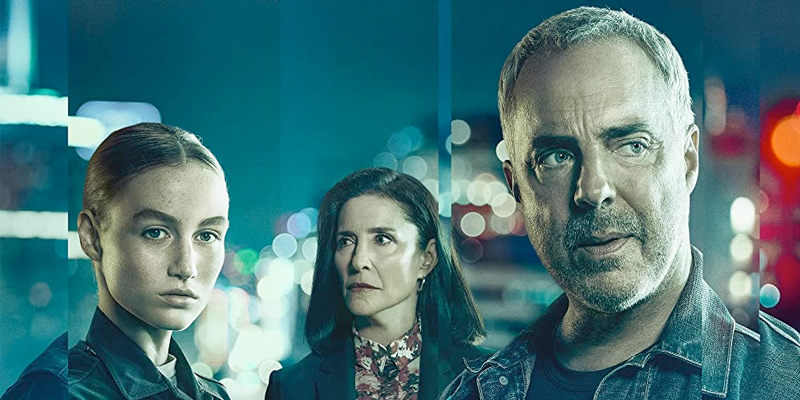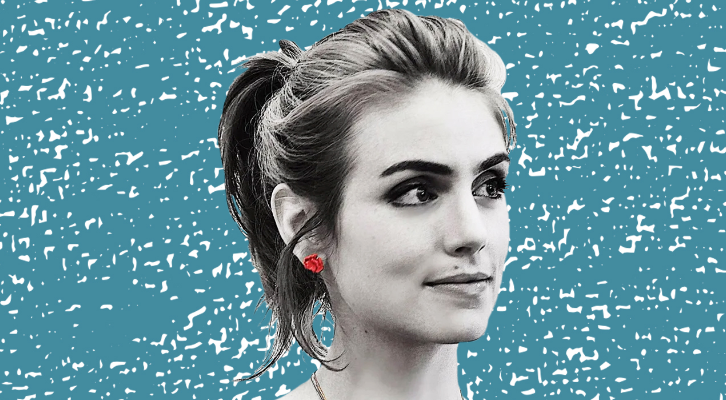When Prime Video’s moody, Los Angeles-set detective drama Bosch took its final bow last June, it did so as the Amazon streamer’s longest running original series. Seven seasons! A feat in any television context, never mind in the world of streaming.
Still, novelist Michael Connelly has been writing the books that Bosch was adapted from since 1992, with this November’s forthcoming Desert Star marking Bosch’s twenty-fourth literary outing. So while seven critically acclaimed seasons may be nothing to sneeze at, the Prime Original’s 2021 exit still left dozens of storylines on the cutting room floor.
Of these, perhaps the most interesting—in terms, at least, of potentially shaking up the Bosch audience’s viewing experience—are the ones in which Detective Hieronymous Bosch, having retired in moral disgust from the Los Angeles Police Department, gives it a go as a private investigator. I mean, not for nothing, but Bosch’s moral disgust with the LAPD transcended subtext before the first season of Bosch was even halfway over; by the time Harry (played with killer chill by Titus Welliver) reached the end of his ethical rope in Season 7, it would have been a disservice to both the character and his fans to have returned him to the institution whose rot he had so effectively uncovered for seven straight seasons.
Which is all to say, it came as no surprise that, shortly after Harry sidled up to the window of the private investigator’s licensing office in the final moments of Bosch series finale, Amazon Studios announced that the creative team behind the series—including Michael Connelly, himself—would be mounting a spinoff on the subscription platform’s ad-supported cousin, Freevee (née IMDb TV), featuring Bosch in his new role as L.A.’s lowest-key—if most morally dogged—private investigator.
In the books, this career move happens nine titles in, first with a two-book arc that starts with Lost Light (2003) and runs through The Narrows (2004), and later with a longer run that starts in 2016’s The Wrong Side of Goodbye, which, as anyone who’s seen the title of the pilot episode might already have guessed, is the book from which this first season of Bosch: Legacy has been (loosely) adapted. Meaning, insofar as the rhythm of Connelly’s original arc for Harry goes, having Welliver’s version shift gears now is pretty accurate. That this creative move also happens to come at a moment in the real world when popular interest in consuming fictional policing as simple entertainment is at its lowest moment in decades is coincidental, but not unimportant. (See: any recent discourse around the history and consequences of “copaganda.”)
We’ll get to the copaganda in a moment. First, though, an answer to the question at the top of every Harry Bosch fan’s mind. Namely—is the spinoff even good?
Well, fans of both Connelly’s books and the long-running flagship series can rest easy: whatever you loved about Bosch, the Prime Original, you’re almost certain to find it in Bosch: Legacy, its Freevee heir—up to and including a killer new kaleidoscopic title sequence from Imaginary Forces, and a couple of believably organic guest turns from Bosch favorites Detective J. Edgar (Jamie Hector), Sergeant Mank (Scott Klace), and retired Hollywood Homicide detective duo Crate and Barrel (Gregory Scott Cummins and Troy Evans).
In fact, starring Bosch-vets Titus Welliver, Mimi Rogers, Madison Lintz as the its three co-leads*, Bosch: Legacy picks up so neatly where the flagship series left off, the only time most fans will remember there’s a difference is when there’s a commercial break. And when I say the spinoff picks up neatly where the original left off, I mean it, the first episode opening less than a year after the last series ended with Harry (Welliver), still officially retired from the LAPD, settling into his new role as a private eye; Maddie (Lintz), now a rookie beat cop working out of Harry’s old Hollywood station, chafing under the restrictions placed on her as a “Phase 2 boot”; and DA Honey Chandler (Rogers), now practicing out of a boutique (read home-based) firm, struggling to cope with the PTSD she developed after being shot twice in the chest by a hired assassin in Bosch’s final season. Add newcomers Stephen A. Chang (Artificial) and Denise G. Sanchez (The Good Place) as Harry’s smooth-as-cool tech guy Maurice “Mo” Bassi and Maddie’s inscrutable Phase 2 training officer Reina Vasquez, respectively, and you’ve got a Los Angeles that manages to feel familiar and fresh all at once.
(*NB: Brody, the very good boy who plays Bosch’s beloved rescue dog, Coltrane, also features throughout Bosch: Legacy’s first season, though only as an occasional guest star. Guess his day rates were just a bit too high for Freevee to afford for the full ten-episode run!)
Speaking of Los Angeles, longtime fans will be heartened to know that the flagship series’ sunbaked noir magic is mostly still there. The city has served as more than a simple background in both the books and the original Prime series, becoming a kind of main character. In the spinoff, which counts among its cinematographers a returning Todd A. Dos Reis, the city is once again visually stunning and richly textured. (The many garden visits Harry makes as he works to track down a client’s potential heirs are particularly successful in this regard.) But more than this, what remains is the sunbaked noir magic of what Los Angeles means, both to the rich people controlling its levers of power, and to the much more vulnerable folks who Harry, with his still-beating mantra that “Everybody counts, or nobody counts,” is so driven to defend. The thing is, whether building his story on the page or on the screen, Connelly has a knack for finding all the ways the city bruises itself and just… pressing down. And that, at least for this Bosch fan, was the number one thing I was looking for Bosch: Legacy to retain.
On that front, however, this newest chapter in the Bosch Cinematic Universe is, unfortunately, a mixed bag.
Throughout the course of the seven seasons the flagship series ran, with Harry so deeply enmeshed in the machinations of the LAPD, that signature bruise-pushing manifested pretty explicitly in the doggedness with which Harry and his partner, J. Edgar (Jamie Hector), worked to uncover the myriad, mostly banal ways in which the architecture of L.A.’s governmental institutions bent the majority of their investigations not towards justice, but towards the preservation of power. This was great. Infuriating from the start, and, given Bosch’s outraged resignation at the end of Season 7, ultimately fruitless. But still: great.
In cutting Harry off from the institution whose failures his moral code so often stood against, however, Bosch: Legacy has to work a lot of new angles to achieve the same effect. And, at least for my money, I’m not fully sold on the result.
First, the good: Though technically occupying separate narrative spaces—Harry as a scruffier Marlowe, Honey as vigilante in Dior, and Maddie as the one LAPD rookie not currently starring on ABC’s The Rookie—their threads still regularly weave together. And not just when all three are called into court for the trial of Carl Rogers, the man who both hired the assassin who shot Honey and (though he was ultimately foiled) put out a hit on Maddie in Bosch’s final season. Given both how ambivalent Maddie has always been about her dad’s chosen profession, and how much disgust Harry feels towards defense attorneys like Honey as a rule, watching them all get up in each other’s literal business like this can be compelling.
That said, things get a bit murkier when any of them are left alone. For instance, while Harry’s new gig as a P.I. gives the series an excuse to slip into a classic noir mold—like any good Philip Marlowe joint, Harry’s main case starts with him rolling up to the sprawling estate of an elderly and grotesquely wealthy client (played with smart subtlety by William Devane) who, in realizing in his final moments that he should have done right by his high school sweetheart all those decades ago, hires Harry to track down any possible heirs he might yet have—it seems to have simultaneously let the writers lean into some, if not bad, then at least schlocky habits. In short, Harry’s investigatory tactics—not to mention his basic approach to self-care—are not good! And not in the fun, what a character way. I mean in the how the hell do you expect to survive another day like this? way. As just one example: in the first episode, L.A. is hit by an earthquake serious enough to crack the sheet glass walls of Harry’s iconic hillside home. And as it’s happening, he just… stays at his kitchen table, watching his record collection shake. I mean, MY MAN.
Neither Honey nor Maddie ace the “what would Bosch do?” test when left to their own devices, either. Though, at least in the early half of the season, the reasons for that are fairly straightforward: in Honey’s arc, her vigilante campaign against the man who ordered her assassination, possibly in a bid to read as “commercial” enough for the USA/TNT vibe Freevee is actively aiming for, is weighed down by a whole Bourne franchise’s worth of Russian mobsters, contract killings, and unnecessary explosions. On the extreme opposite end, meanwhile, Maddie’s story is stifled by the abusive dullness of life as an LAPD beat cop—a career choice which Harry consistently supports (see: Legacy), but which Maddie, until the final episode, never really seems able to articulate her commitment to. (Beyond, of course, the fact that it was the path both her parents took to try and help the vulnerable, which she does have a track record of caring about.)
And this is where the “copaganda” discourse comes in. Because, while Bosch never shied away from showing the dark underbelly of the LAPD as an institution—and while Bosch: Legacy wouldn’t even exist without Harry having walked away from that institution in that aforementioned moral disgust—the fact of the matter is, the idea that police work as a concept is a moral good is so deeply entrenched in American pop culture that, for at least the bulk of its first season run, Bosch: Legacy can’t seem to quit the idea that there may someday be enough “good apples” out there that, reams of real-world evidence to the contrary aside, the LAPD really is an institution worth saving.
Now, the show never says that in so many words. In fact, to its considerable credit, it puts in the work reminding us just how intractably broken the institution Harry left behind is. (I mean, it will probably surprise no one to learn that Bosch clears more open official cases this season doing real detective than any of the actual detectives in charge of those cases.) But in sending Maddie (of all people!) down the same beat cop path Harry left behind—and, moreover, having her do her own off-the-clock detective work chasing down the Thai Town rapist her TO keeps telling her to just stop thinking about—every moment Bosch: Legacy isn’t explicitly reminding us that the institution she wants to build a career within is diseased feels like it’s just further perpetuating the “good apple” myth.
This is maddening! But at the same time, I get it: the image of cops as TV’s ultimate good guys is so pervasive in pop culture, even the best of intentions can’t escape it. And what’s more, if we’re ever to get to a place where Hollywood can put together nuance and entertainment in a way that’s sustainable, I trust the Bosch/Bosch: Legacy team to clear the path. Harry just has to work on not falling to a preventable early death in any more earthquakes before we get there.
The first four episodes of Bosch: Legacy drop Friday, May 6 on Freevee. The remaining episodes of Season 1 will premiere two at a time every Friday through May 27.

















